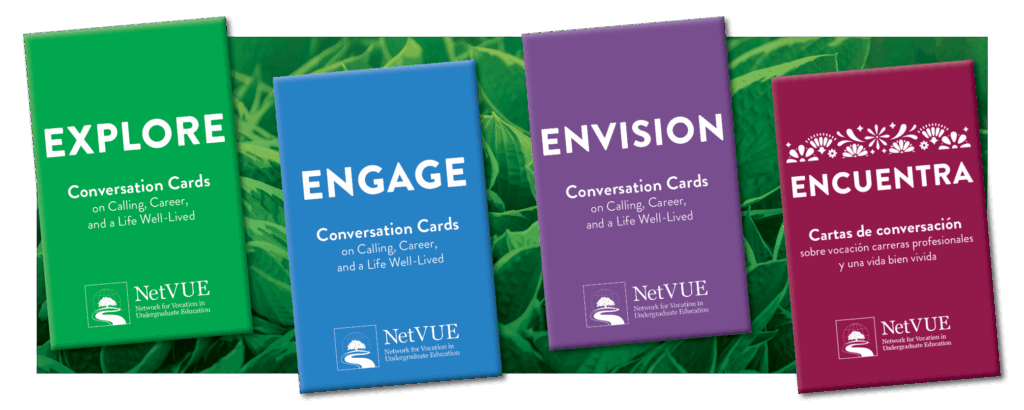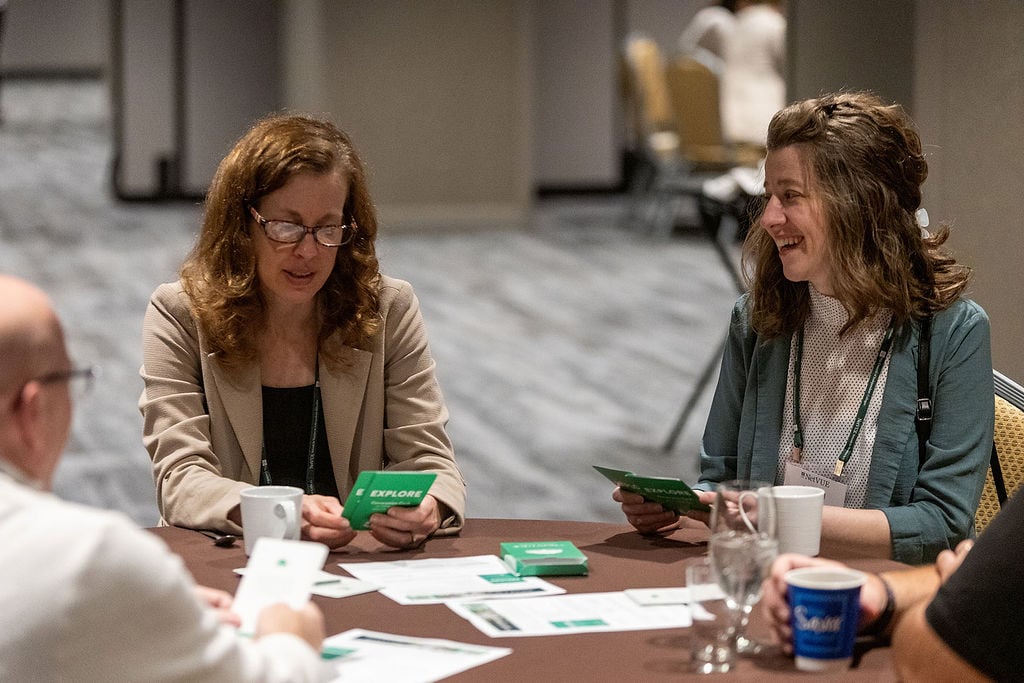The right question at the right time can support, empower, and challenge students as they grow in their understanding of self and world. NetVUE is pleased to offer its member institutions Conversation Card decks as a tool for vocational discernment and exploration on their campuses. The cards invite students and educators to reflect upon personal strengths and perspectives, professional aspirations, religious and ethical commitments, civic responsibilities, and the dispositions and habits that constitute a life well lived.
Staff and faculty members on our campuses will benefit from having these rich and compelling questions at the ready for a variety of campus contexts—with individuals, small groups, or large gatherings:
- Classroom discussions
- Private journaling
- Academic & career advising
- Leadership development
- Team-building exercises
- Professional development for faculty, staff, & community partners

Available Decks
Four decks of cards have been carefully designed to be used individually or together. Each deck contains questions for students engaging all levels of vocational inquiry, from first-year icebreakers to senior-year capstones.

Explore cards cultivate students’ self-knowledge, inviting them to consider how their past has shaped who they are and equipping them to tell their own story.
Engage cards encourage students to reflect upon practices for thoughtfully engaging the world around them as they discern personal, academic, and professional goals.
Envision cards help prepare students for life beyond college, asking them to consider not only career aspirations but the contours of a well-lived life.
Encuentra cards highlight the cultures of Hispanic/Latine students while encouraging students from all backgrounds to consider how their cultural roots shape their sense of meaning, purpose, and belonging.
All four decks are now available. Every member institution receives two copies of each deck, sent to their official NetVUE Campus Contact. Additional decks may be ordered through their campus’s NetVUE Campus Contact; consult our ordering policies here. Questions regarding your campus’s NetVUE contact can be directed to Ashley Woodbeck, NetVUE office manager, at awoodbeck@cic.edu. For other inquiries regarding the NetVUE Conversation Cards, please contact Krista Hughes, NetVUE director of resource development at khughes@cic.edu.
Continue reading below for suggestions for using the cards, potential activities, and how NetVUE member institutions can obtain additional card desks. For additional information about the Encuentra deck (including ideas for use and special considerations), follow this link.

This resource is made possible by generous support from Lilly Endowment Inc.
Suggestions for Use
Vocational inquiry is a skill. Students grow in their capacities to consider more complex questions and to take greater risks as they reflect on their lives and the world in which they live. Context also impacts students’ capacities for depth, complexity, and vulnerability. The questions are intended to take students beyond the superficial and therefore should be used with intention and care. Some vocation principles that will be helpful to keep in mind when using this valuable resource:
Vocational inquiry requires time.
Slow down. Pause between questions. Allow for silence. If there is more than one question on a card, ask and process the first question before moving on to the second.
Vocational inquiry invites vulnerability.
Some of the questions in these decks are deep and personal. Consider context through the eyes of the students. Invite them to choose from among several questions and allow them to opt in or out of an activity or a question, while still encouraging them to engage internally.
Vocational inquiry opens pathways.
The questions on the cards are simply a starting point. Go deeper if the conversation seems to call for it. Invite students to “say more” or to tell a story. Ask “Why?”
Vocational inquiry loves good questions.
Sometimes the richest conversations are not in response to the questions but about the questions themselves. Ask: What sort of insights is this question drawing out? How does exploring this question contribute to your own vocational journey? Which questions really stirred your thinking—and which would you prefer not to consider?
Each card has a designated level:

Appropriate for ice breakers or for students new to vocational exploration

Effective for students deepening their vocational inquiry and for groups with a basic foundation of trust

Best for students experienced in vocational exploration and for groups or teams with a strong foundation of trust
Activities

There are many ways to use the conversation cards, and leaders are encouraged to think creatively. Factors to consider in the design of activities:
- The size of the group;
- How well group members know each other;
- How much time the activity will take, and how much is available;
- The purposes for which the cards are being used (self-reflection, community building, etc.).
Here are a few ideas for using the cards with both students and a wide range of campus constituencies. You can also learn about the many creative ways your colleagues at NetVUE member institutions are using the conversation cards on their campuses to successfully promote vocational exploration among students and professional development among faculty and staff.
Larger Groups
Icebreaker: Hand individuals on one side of the room one card each. Once distributed, ask everyone to stand up and then invite everyone without a card to find someone with a card. Once people are paired off, each person asks the question and listens to the other’s responses. The facilitator can circle the room and, if some people seem to be finished while others are still going, offer another card.
Table Conversation: Give a table of two to five people three cards. Ask them to consider the questions and decide which one they want to talk about. Have them respond to their chosen question. If there is time, process with the whole room. Once attention is drawn back to the full group, rather than asking them to report out, instead explore:
- Why tables chose the questions they did, and what it encouraged them to process
- why they didn’t choose to answer other questions
This activity works well among both those new to one another and those who know each other well—and just as well with staff, faculty members and community partners as with students. It is a reliable community building activity that does not take a lot of time but rarely fails to foster connection.
Small Groups
Warm Up: Start a class or a meeting by posing a question in lieu of asking, “how’s everyone doing?”
Casual Teambuilding: Supply a student group or team with a deck, some snacks, and a place to get comfortable, and let them take over from there.
Any Size Group
Journaling: Invite individuals to journal on a question.
Think–Pair–Share: Invite individuals to think or write about a question for a few minutes; then ask them to turn to a neighbor and exchange responses; and finally invite anyone who wants to share with the wider group to share.
Question the Questions: At any time, it can be fruitful to make the questions themselves the object of inquiry. This allows people to engage questions in a way that is less vulnerable than responding to them. Probing the questions also builds capacity for vocational inquiry among students, as well as for staff and faculty.
Creators of the NetVUE Conversation Cards
Professionals serving in a range of staff and faculty roles on NetVUE campuses collaborated on the development and design of these decks, making them a resource by the network and for the network.
Creators of the Explore, Engage, and Envision Conversation Cards
Krista E. Hughes (editor), Director of Resource Development, NetVUE; Adjunct Professor of Religion, Wofford College (SC)
Rachael Baker, Associate Director, NetVUE
Casey Cline, Director of Workforce and Career Development, Lander University (SC)
Melissa Conroy, Associate Professor of Religion, Muskingum University (OH)
Esteban Loustaunau, Director, Center for Purpose & Vocation and the Community Service Learning Program, Professor of Spanish, Assumption University (MA)
Stephanie Johnson, Dean of the College of Liberal Studies and Professor of English, Pacific Lutheran University (WA)
Ron Robinson, Perkins-Prothro Chaplain and Professor of Religion, Wofford College (SC)
James Stukes, Assistant Dean of Student Success and College Access, Wofford College (SC)
Meghan Walsh, Executive Director of Advising and Career Development, St. Norbert College (WI)
Nathan Webb, Executive Director of Formation and Leadership Development, Belmont University (TN)
David Wilstermann, Program Operations and Data Analytics Manager, Calvin University (MI)
Creators of the Encuentra Conversation Cards
Krista E. Hughes (co-editor), Director of Resource Development, NetVUE; Adjunct Professor of Religion, Wofford College (SC)
Esteban Loustaunau (co-editor), Director, Center for Purpose & Vocation and the Community Service Learning Program, Professor of Spanish, Assumption University (MA)
Emily Davidson, Associate Professor of Hispanic & Latino Studies, Pacific Lutheran University (WA)
Leslie Flores, former Director of Title IX & Equity Compliance, Texas Lutheran University (TX)
Monique Jiménez-Herrera, Vice Provost for Academic Initiatives & Faculty Success, Professor of Psychology and Licensed Psychologist, St. Edward’s University (TX)
Amalia E. Merino, Hispanic Academic Success Coordinator, Southwestern University (TX)
Sarah Micu, Director of Student Success Services, Fresno Pacific University (CA)
Janet Nava Cardenas, Assistant Director of Student Employment & Career Education, Career & Professional Development, Mount Saint Mary’s University (CA)
Ezequiel Peña, Professor of Psychology, Our Lady of the Lake University (TX)
Lorri J. Santamaría, former Associate Vice President Strategy, California Lutheran University (CA)
Contact Information
Questions about this new NetVUE resource can be directed to Krista E. Hughes, director of resource development, at khughes@cic.edu.

To report a technical problem with the website, or to offer suggestions for navigation and content issues, please contact Alex Stephenson, NetVUE communications coordinator, at astephenson@cic.edu.



